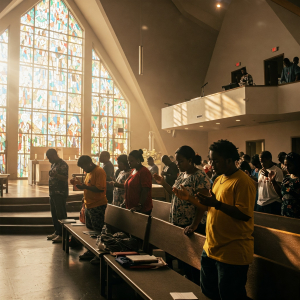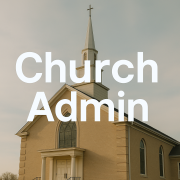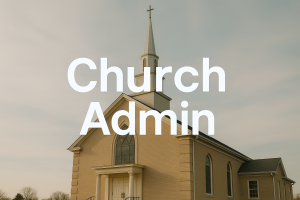5 Ways Smart Church Management Software Is Uniting Kenyan Congregations in the Digital Age
The vibrant tapestry of Kenyan society is richly interwoven with the threads of faith. Across the nation, from bustling urban centers to serene rural landscapes, churches stand as pillars of community, offering spiritual guidance, social support, and a profound sense of belonging. In this dynamic and rapidly evolving world, the ways in which congregations connect, communicate, and operate are also undergoing a significant transformation. The digital age, with its pervasive influence on nearly every aspect of life, is now shaping the very fabric of church communities in Kenya, presenting both opportunities and the imperative for adaptation.

5 Ways Smart Church Management Software Is Uniting Kenyan Congregations in the Digital Age
Leading this transformative wave is the adoption of smart church management software, exemplified by platforms like ChurchesAdmin.com. These digital tools are not merely administrative aids; they are becoming integral to fostering stronger connections, enhancing engagement, and ultimately, uniting Kenyan congregations in profound new ways. By streamlining operations, improving communication, and providing valuable insights, this technology is empowering churches to focus more intently on their core mission: nurturing spiritual growth and fostering a cohesive community of faith.
Let’s explore in greater detail the five powerful ways digital church management is bringing Kenyan congregations closer together in this increasingly digital age:
1. Seamless Communication Across Ministries: Breaking Down Silos and Amplifying the Message
In the vibrant ecosystem of a Kenyan church, numerous ministries often operate with a degree of autonomy, each focusing on specific demographics or areas of service. While this specialization is crucial for addressing the diverse needs of the congregation, it can sometimes lead to fragmented communication. Information about events, activities, and important announcements might be disseminated through various channels – physical notice boards, word-of-mouth, disparate WhatsApp groups – leading to missed opportunities for participation and a sense of disconnect among members involved in different ministries.
Smart church management software offers a centralized communication hub, effectively breaking down these silos. Leaders can craft targeted messages tailored to specific groups – the youth fellowship preparing for an outreach program, the women’s guild organizing a charity drive, the men’s ministry planning a mentorship session, or the entire congregation for an upcoming Sunday service. These messages, containing event reminders, prayer requests, urgent announcements, or even inspiring devotional content, can be delivered directly to members’ smartphones via SMS, email, or in-app notifications.
Consider the logistical challenges of announcing a special fundraising drive for a church building project across a large congregation with multiple subgroups. Traditionally, this might involve numerous announcements during services, printed flyers distributed (often inefficiently), and a flurry of messages through informal channels. With a smart platform, a single well-crafted announcement can reach every member instantly, with options for follow-up reminders and easy links to online giving platforms.
Furthermore, these platforms often facilitate two-way communication. Members can easily RSVP to events, sign up for volunteer opportunities, or even submit prayer requests through the system. This interactive capability fosters a greater sense of participation and ensures that the church leadership is responsive to the needs and interests of the congregation. Imagine a new member feeling instantly connected by receiving a personalized welcome message and information about relevant ministries based on their interests indicated during registration. This level of personalized communication strengthens the bonds within the church community from the very beginning.
In the Kenyan context, where mobile phone penetration is high and digital literacy is growing rapidly, leveraging these communication features can significantly enhance outreach and engagement, especially with younger demographics who are often more digitally inclined. Churches can also use these platforms to share multimedia content – sermon recordings, inspirational videos, and photo galleries of church events – further enriching the spiritual experience and fostering a sense of shared identity.
2. Effortless Membership Tracking and Engagement: Nurturing Individual Connections within the Collective
The strength of any church lies in its people – the individuals who come together to form a community of faith. However, managing the diverse needs and journeys of a growing congregation can be a significant administrative undertaking. Traditional methods of record-keeping, often relying on paper-based systems or cumbersome spreadsheets, can be inefficient, prone to errors, and lack the personal touch that is so vital in a pastoral context.
Smart church management software revolutionizes membership tracking by providing a centralized and easily accessible database of all members. This goes far beyond simply recording names and contact information. The software allows for the tracking of crucial details such as attendance at services and events, birthdays, anniversaries, spiritual milestones like baptisms or confirmations, and involvement in various ministries. This comprehensive overview provides church leaders with a holistic understanding of their congregation.
Imagine a pastor being automatically reminded of a long-standing member’s birthday, enabling a personal phone call or message of well wishes. Consider the ability to easily identify and reach out to new visitors who attended a recent service, offering them a warm welcome and information about how to get more involved. This level of personalized follow-up can significantly enhance retention and foster a stronger sense of belonging.
Furthermore, these platforms facilitate meaningful engagement by allowing leaders to track individual spiritual growth and needs. Records of participation in Bible studies, small groups, and volunteer activities can provide valuable insights into members’ engagement levels and areas where they might benefit from further support or encouragement. This data can inform pastoral care efforts, ensuring that no one feels overlooked or disconnected.
In the Kenyan context, where community and personal relationships are highly valued, the ability to nurture individual connections within the larger congregation is paramount. Smart church management software empowers church leaders to move beyond mere administrative tasks and focus on building genuine relationships with their members, fostering a warm and inclusive environment where everyone feels seen, valued, and supported on their spiritual journey. This personalized approach strengthens the sense of unity and collective identity within the church.

5 Ways Smart Church Management Software Is Uniting Kenyan Congregations in the Digital Age
3. Automated Giving and Transparent Finances: Fueling Ministry with Trust and Accountability
The financial health of a church is intrinsically linked to its ability to carry out its mission and serve its community. Tithes, offerings, and donations are the lifeblood of ministry, enabling churches to fund their various activities, support their staff, and contribute to wider social causes. However, managing these finances effectively and transparently can be a complex and time-consuming process, often relying on manual record-keeping and potentially lacking the level of accountability that fosters trust within the congregation.
Smart church management software integrates automated giving tools that streamline the process of financial contributions. By connecting with popular mobile money platforms like M-PESA, as well as traditional banking systems, these platforms make it incredibly convenient for members to give anytime, anywhere. Whether it’s during a service, from the comfort of their homes, or even while traveling, members can easily contribute through their preferred method. This ease of giving can often lead to increased and more consistent financial support for the church’s work.
Beyond facilitating giving, these software solutions also provide robust financial management capabilities. They automate the tracking of all income and expenses, generate real-time financial reports, and provide a clear and transparent overview of the church’s financial status. This level of transparency is crucial for building trust within the congregation. When members can see how their contributions are being used to support the church’s mission, they are more likely to give willingly and generously.
Imagine a church treasurer being able to generate detailed reports on tithes received, project-specific donations, and overall expenditure with just a few clicks. This eliminates the need for laborious manual calculations and reduces the risk of errors. Furthermore, these reports can be shared with the church leadership and even the wider congregation (in an appropriate and summarized format), fostering a culture of accountability and financial responsibility.
In the Kenyan context, where trust and transparency are highly valued in all aspects of community life, the financial accountability offered by smart church management software is particularly significant. By providing clear and accessible financial information, churches can strengthen the bond of trust with their members, empowering them to support the ministry with confidence, knowing that their contributions are being managed responsibly and effectively. This financial transparency ultimately contributes to a greater sense of unity and shared purpose within the congregation.
4. Streamlined Event Planning and Volunteer Coordination: Mobilizing the Congregation for Collective Action
The life of a vibrant Kenyan church is often punctuated by a multitude of events – regular Sunday services, special crusades, community outreach programs, youth conferences, weddings, funerals, and various ministry-specific gatherings. Organizing these events effectively requires meticulous planning, clear communication, and the enthusiastic involvement of volunteers. Traditional methods of event planning and volunteer coordination, often relying on manual sign-up sheets and fragmented communication, can be inefficient and lead to logistical challenges.
Smart church management software offers a centralized platform for streamlining the entire event planning process. Churches can easily schedule events, manage venues, communicate logistical details, and track participant registrations all in one place. This eliminates the need for multiple spreadsheets, endless email threads, and the potential for miscommunication.
Crucially, these platforms also greatly simplify volunteer coordination. Church leaders can create lists of volunteer needs for specific events, outlining the various roles and responsibilities. Members can then easily sign up online for the roles that align with their skills and interests. The software can automatically send reminders to volunteers, provide them with necessary information, and track their participation. This makes it easier than ever for members to contribute their time and talents to the church’s activities, fostering a stronger sense of ownership and collective responsibility.
Imagine a church organizing a large-scale community outreach program. With smart software, the organizers can create different volunteer teams (e.g., registration, logistics, catering, outreach), specify the number of volunteers needed for each team, and allow members to sign up online. The system can then automatically send confirmation emails and reminders to the volunteers, ensuring that everyone is well-informed and prepared. This streamlined process not only makes event organization more efficient but also empowers more members to get involved, fostering a stronger sense of unity and shared purpose in serving the community.

5 Ways Smart Church Management Software Is Uniting Kenyan Congregations in the Digital Age
In the Kenyan context, where the spirit of Harambee (pulling together) is deeply ingrained in the culture, the ability to effectively mobilize volunteers is particularly important. Smart church management software provides the tools to harness this spirit, making it easier for members to contribute their time and skills, strengthening the bonds of community and ensuring that church events are successful and impactful.
5. Data-Driven Ministry Growth: Understanding the Congregation to Serve More Effectively
In an increasingly data-driven world, the ability to collect, analyze, and interpret information is crucial for effective decision-making in virtually every field, including ministry. Traditional methods of tracking church activities often provide limited insights into the overall health and engagement of the congregation. This can make it challenging for church leaders to identify areas of growth, understand the needs of their members, and tailor their ministries accordingly.
Smart church management software offers powerful analytics capabilities that provide valuable insights into various aspects of church life. Leaders can track trends in attendance at services and events, analyze giving patterns, monitor engagement in different ministries, and even gather demographic information about their congregation (while respecting privacy and data protection regulations).
This data-driven approach empowers church leaders to make more informed decisions. For example, by analyzing attendance trends, they might identify specific demographics that are less engaged and then develop targeted programs or outreach initiatives to better connect with them. By examining giving patterns, they can understand the financial capacity of their congregation and plan fundraising efforts more strategically. By tracking participation in different ministries, they can identify areas of strength and areas that might need more support or revitalization.
Imagine a church noticing a decline in youth attendance. By analyzing the data, they might identify the reasons for this trend (e.g., lack of relevant programs, inconvenient meeting times) and then use this information to develop new initiatives that are more appealing to young people. Similarly, by tracking the effectiveness of different communication channels, they can optimize their outreach strategies to ensure that their message is reaching the right people in the most effective way.
In the Kenyan context, where churches play a significant role in social development and community empowerment, the ability to understand the needs of their congregation and the wider community is paramount. Data-driven insights can help churches to identify pressing social issues, tailor their outreach programs to address these needs effectively, and demonstrate the impact of their ministry. This evidence-based approach can enhance the church’s relevance and strengthen its role as a vital force for good in the community, fostering unity not only within the congregation but also in its engagement with the wider society.
Embracing the Future – Together: A Connected and Flourishing Church
Kenyan churches stand as beacons of hope and unity, deeply embedded in the social and spiritual fabric of the nation. By embracing the power of smart church management software, they are not simply adopting new technologies; they are investing in the future of their congregations, building stronger foundations for connection, growth, and service. Platforms like ChurchesAdmin.com are empowering these vital communities to navigate the complexities of the digital age while staying true to their core values of faith, fellowship, and compassion.
As Kenyan churches increasingly leverage these digital tools, they are discovering new and innovative ways to unite their congregations, foster deeper relationships, and amplify their impact in the world. The seamless communication, effortless engagement, transparent finances, streamlined event planning, and data-driven insights offered by smart church management software are not just about efficiency; they are about creating a more connected, vibrant, and unified community of faith – a community ready to thrive and make a lasting difference in the digital age and beyond.
How has technology played a role in connecting and growing your church community? We invite you to share your experiences and insights in the comments below, as we continue to explore the transformative power of digital tools in strengthening the bonds of faith in Kenya.
ChurchesAdmin.com: Empowering Kenyan Churches for a Connected Future.







